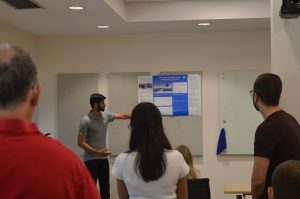Walking past the closed doors of research labs felt like taking a peek into a vault of unfound knowledge with students and mentors huddled around what oftentimes looked like a sci-fi device. The sight has always fascinated me, and I wanted to try it out and see what research is without committing my entire Master’s degree to it. The CREATE-U project was helpful in addressing this, where I could get a taste of what research is like so that I could figure out if I wanted it or not in the future.
One of the biggest questions I had starting off is how a research project is different from the numerous design projects we’ve undertaken during our regular coursework. We’ve all had a taste of what an engineering project is like starting with the cardboard chair – we have a known deliverable and we try to make our way to it through a defined process – but my research experience was quite different.
Unlike a design project, the final deliverable is left to us to choose. I initially thought that would make it simpler – what I didn’t expect was the number of rabbit holes it would open up during the first few weeks as I tried to figure out what direction I wanted my project to take. It was an exciting, overwhelming feeling when every new paper I read gave me a new idea of what I could do as a part of my project. I ended up deciding on studying the flow characteristics of aerosolized powder drugs flowing through a catheter under the overarching project that my faculty supervisor had given me and the Master’s student mentoring me. Okay, that sounds like a lot of words that probably doesn’t make too much sense. Well, it didn’t to me either, but that’s part of the fun and the process! Starting off and learning something new that you haven’t seen before and then trying to ask and answer questions that might not have been covered. Over a few weeks, I’d taken my basic knowledge of fluid mechanics and used those basic building blocks to learn about multiphase flow and a few other things to be able to take this problem head-on.
We also had regularly scheduled classes where we talked about research practices and writing styles, and initially, I thought that would just be adding more to my plate of responsibilities. However, getting some context around my research work was immensely helpful in orienting myself through the process, as well as knowing I wasn’t alone in it with the nine of us in the cohort getting to bounce ideas off each other. There were quite a few weeks where it was busier than I thought it would be with both coursework and research work picking up pace simultaneously. It all paid off with excitement of designing my own experimental setup, assembling it and then running experiments to answer a question that I found worth investigating! It was also a very weird and proud feeling when I had to present my findings in front of research faculty members – and for once I knew a little bit more about the topic than they did.
